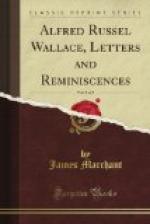Old Orchard, Broadstone, Dorset. December 28, 1909.
Dear Dr. Archdall Reid,—Many thanks for your very interesting and complimentary letter. I am very glad to hear of your new book, which I doubt not will be very interesting and instructive. The subjects you treat are, however, so very complex, and require so much accurate knowledge of the facts, and so much sound reasoning upon them, that I cannot possibly undertake the labour and thought required before I should feel justified in expressing an opinion upon your treatment of them....
I rejoice to hear that you have exposed the fallacy of the claims of the Mendelians. I have also tried to do so, but I find it quite impossible for me to follow their detailed studies and arguments. It wants a mathematical mind, which I have not.
But on the general relation of Mendelism to Evolution I have come to a very definite conclusion. This is, that it has no relation whatever to the evolution of species or higher groups, but is really antagonistic to such evolution! The essential basis of evolution, involving as it does the most minute and all-pervading adaptation to the whole environment, is extreme and ever-present plasticity, as a condition of survival and adaptation. But the essence of Mendelian characters is their rigidity. They are transmitted without variation, and therefore, except by the rarest of accidents, can never become adapted to ever-varying conditions. Moreover, when crossed they reproduce the same pair of types in the same proportions as at first, and therefore without selection; they are antagonistic to evolution by continually reproducing injurious or useless characters—which is the reason they are so rarely found in nature, but are mostly artificial breeds or sports. My view is, therefore, that Mendelian characters are of the nature of abnormalities or monstrosities, and that the “Mendelian laws” serve the purpose of eliminating them when, as usually, they are not useful, and thus preventing them from interfering with the normal process of natural selection and adaptation of the more plastic races. I am also glad to hear of your new argument for non-inheritance of acquired characters.—Yours very truly,
ALFRED R. WALLACE.
* * * * *
TO SIR W.T. THISELTON-DYER
Old Orchard, Broadstone, Wimborne, February 8, 1911.
Dear Sir W. Thiselton-Dyer,—I thank you very much for taking so much trouble as you have done in writing your views of my new book.[38] I am glad to find that you agree with much of what I have said in the more evolutionary part of it, and that you differ only on some of my suggested interpretations of the facts. I have always felt the disadvantage I have been under—more especially during the last twenty years—in having not a single good biologist anywhere near me, with whom I could discuss matters of theory or obtain information as to matters of fact. I am therefore the more pleased that you do not seem to have come across any serious misstatements in the botanical portions, as to which I have had to trust entirely to second-hand information, often obtained through a long and varied correspondence.




